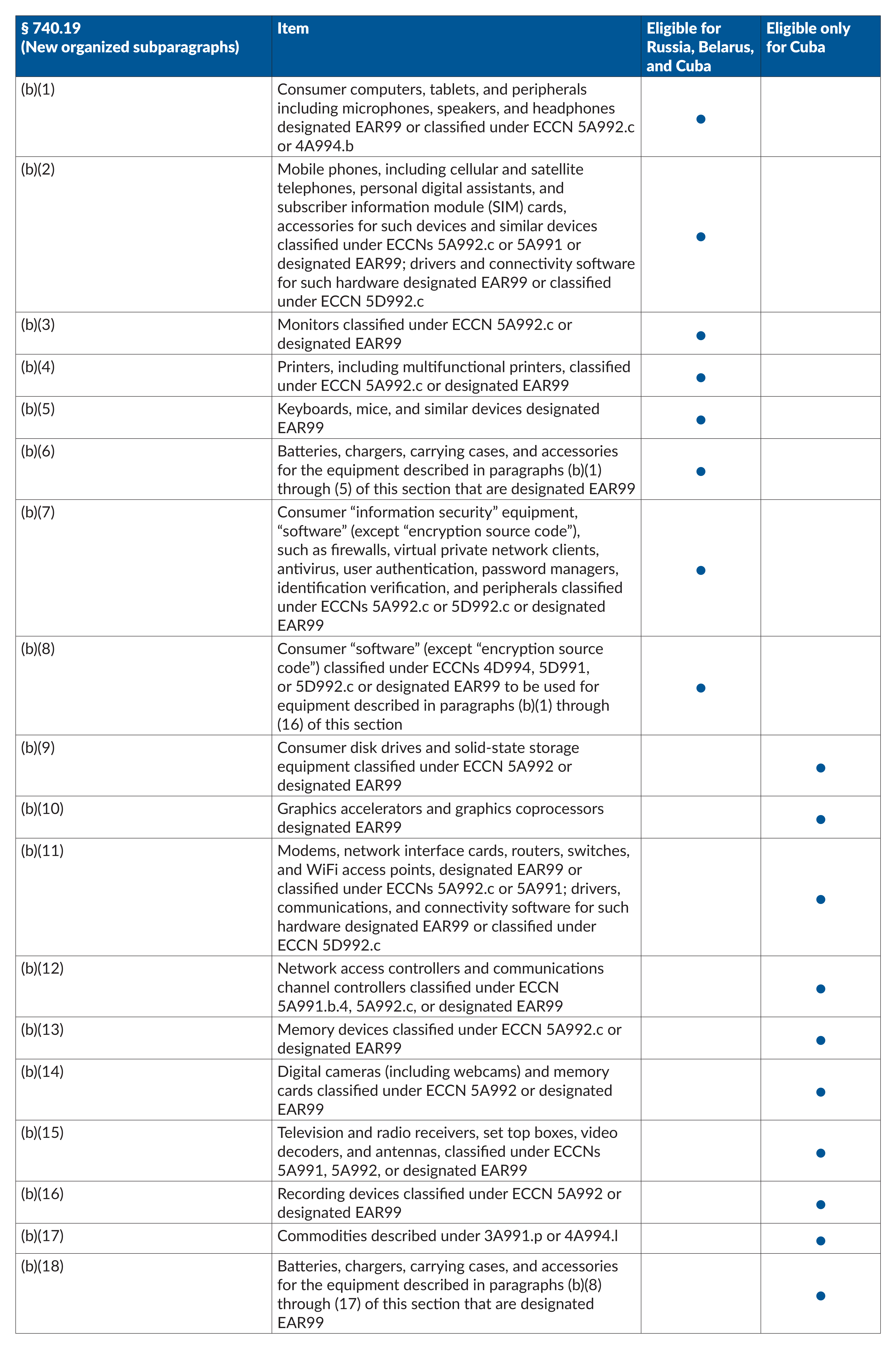Last year, we updated you on BIS's move to ban EAR99 items from being exported to Russia and Belarus. We (half-jokingly) noted that kitchen sinks might one day be added to the list. And that day has come: stainless steel kitchen sinks are now officially banned from being exported to Russia and Belarus.
In a recent blog post on Russia sanctions, we noted that the U.S. Office of Foreign Assets Control (OFAC) has increased sanctions against Russian financial infrastructure. On the same day, the Bureau of Industry and Security (BIS) also announced its own proposed regulations against Russia. These BIS regulations are now in effect as final rules published on June 18, 2024.
In summary, the new rules further strengthen export controls to Russia and Belarus as follows:
- Addition of EAR99 items prohibited from export without a license.
- Imposes new software license requirements for certain EAR99 software.
- Narrows the scope of products and software that are covered by the Consumer Communications Device (CCD) license exception.
- Consolidating sanctions against Russia and Belarus into a single section of the Export Administration Regulations (EAR).
- Adds an address to an entity list structure.
Each significant change is explained in more detail below.
1. The Kitchen Sink Rule: Prohibiting Unlicensed Exports of EAR99 Items
The new regulations add 522 new Harmonized Tariff Schedule (HTS) six-digit codes (including stainless steel kitchen sinks) to Supplement 4 to Part 746 of the EAR and add certain riot control chemicals to Supplement 6 to Part 746. Other prohibited items include certain kitchen tables (HTS 7323.10, 7323.91, 7323.92, 7323.93, 7323.94, 7323.99) and feather dusters (HTS 9603.90). Under the new regulations, Supplement 4 now covers 18 additional chapters of the HTS Code. These items require a license for export or reexport to Russia or Belarus, or for transfer (in-country) within Russia or Belarus.
We encourage readers to take the time to review the newly added items, as some of the prohibited items may go beyond what would normally be considered to support Russia's military-industrial base.
The licensing requirements for these additional items will go into effect on June 12, 2024.
2. New Restrictions on EAR99 Software
Beginning September 16, 2024, new rules expand license requirements to certain EAR99 software (new paragraph EAR § 746.8(a)(8)). EAR99 software that requires a license to be exported, reexported, or transferred to or within Russia and Belarus is as follows:
- Enterprise Resource Planning (ERP);
- Customer Relationship Management (CRM)
- Business Intelligence (BI)
- Supply Chain Management (SCM)
- Enterprise Data Warehouse (EDW)
- Computerized Maintenance Management System (CMMS)
- Project Management Software, Product Lifecycle Management (PLM)
- Building Information Modeling (BIM)
- Computer-Aided Design (CAD)
- Computer-Aided Manufacturing (CAM)
- Engineering to Order (ETO)
The licensing requirement also includes specified categories of software updates. Thankfully, BIS has created two exceptions where a license is not required.
If the EAR99 software is for an entity “engaged solely in the agricultural or medical industries,” and
The EAR99 software and items controlled by Export Control Classification Numbers (ECCNs) 5A991, 5A992.c, and 5D992.c are destined for certain types of civilian end users in Russia and Belarus, such as wholly owned subsidiaries, branches, or offices of U.S. companies or companies headquartered in A:5 and A:6 countries, and joint ventures between U.S. and A:5 or A:6 companies.
3. Reducing the Scope of License Exception CCD
The EAR contains a license exception (known as License Exception CCD) for certain consumer communications devices and software for Cuba, Russia, and Belarus. In the case of Russia, the exception is limited to personal communications devices and software (not business or enterprise products) for use by individual consumers. However, the exception is available for exports to commercial entities and companies that are not owned or controlled by the Russian government. look BIS Russian Exports Frequently Asked Questions (May 2, 2022).
The new rules narrow license exception CCD for Russia and Belarus, effective June 12, 2024, to restrict certain devices and software to the following:

4. Consolidating sanctions against Russia and Belarus into a single EAR section
Prior to the new rules, licensing requirements for exports, reexports, and transfers (in-country) to or within Russia and Belarus were found primarily in three sections of the EAR: Section 746.5 (miscellaneous industrial products), Section 746.8 (primarily items on the Commerce Control List and items subject to the Russia- and Belarus-related foreign direct product rules), and 746.10 (luxury goods).
All of these licensing requirements have now been consolidated into a revised and expanded section 746.8, a welcome change that will make the regulations easier for readers to understand.
5. Entity List Structure Changes – High Diversion Risk Addresses
BIS added five entities to the Entity List, as well as eight addresses titled Address 01, Address 02, etc. This is a change from the usual way BIS adds entities to the Entity List. The new rules require exporters to be licensed to: All entities that use the newly added address.
While the involvement of companies co-located with listed entities is typically a red flag in export transactions, BIS has now added explicit licensing requirements for addresses repeatedly used by companies engaged in activities contrary to U.S. national security or foreign policy interests, so exporters and practitioners should scrutinize entity names and addresses.
We continue to monitor new sanctions and export control regulations against Russia and their impacts and will provide updates here.


